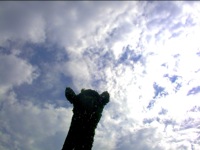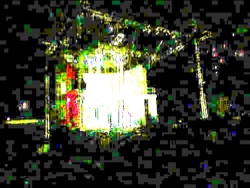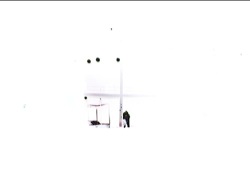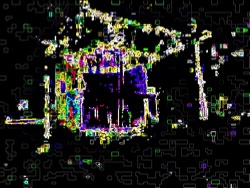19 August 2005 to 25 July 2005
The Field Mice: "Emma's House" (1.7M mp3)
I'm still not getting through sunny days without listening to Waltham's blast of uncomplicatedly shallow puppy-romantic zeal at least once, but it's good to have counterpoint, and if Waltham are a recursivist's dream of a band trying to impress girls by playing songs about trying to impress girls by being in a band, then the Field Mice were their polar opposite, a band about trying to figure out how best to end up alone. This one reduces melancholy almost past its essence, understanding perfectly that the core of redemptive loneliness is self-circumscribing, and that in the perfect portrait of sadness details exist only to anchor atmosphere.
I'm still not getting through sunny days without listening to Waltham's blast of uncomplicatedly shallow puppy-romantic zeal at least once, but it's good to have counterpoint, and if Waltham are a recursivist's dream of a band trying to impress girls by playing songs about trying to impress girls by being in a band, then the Field Mice were their polar opposite, a band about trying to figure out how best to end up alone. This one reduces melancholy almost past its essence, understanding perfectly that the core of redemptive loneliness is self-circumscribing, and that in the perfect portrait of sadness details exist only to anchor atmosphere.
She touches three keys with the same fingers she must have run through your hair, and then we are away and I will never have to see you again.
She stands by windows onto ten worlds, watching a hundred billion people dodge through each other's enmities, and we duel quietly with our convictions about what she hopes to see among them.
It is only through the invisible mercy of infinitesimal machines that she can breathe in this air and my company.
You have no idea how much more courage it took to come out here alone with what I know and brought with me than to land on these rocks where we know nothing and owe nothing.
In the logs it is at first Minerva, and only self-consciously do we leave off the catalog number; and then later Beta, when discovered implications begin to eclipse portaged expectations; and in my mind it is half of the time Home, and half of the time only Without You.
She stands by windows onto ten worlds, watching a hundred billion people dodge through each other's enmities, and we duel quietly with our convictions about what she hopes to see among them.
It is only through the invisible mercy of infinitesimal machines that she can breathe in this air and my company.
You have no idea how much more courage it took to come out here alone with what I know and brought with me than to land on these rocks where we know nothing and owe nothing.
In the logs it is at first Minerva, and only self-consciously do we leave off the catalog number; and then later Beta, when discovered implications begin to eclipse portaged expectations; and in my mind it is half of the time Home, and half of the time only Without You.
¶ new design, new complaints · 12 August 2005
I have switched over to my new site-design. Hopefully everything is working. If you find anything broken, please let me know.
If the new systems are working, they are even capable of delivering you a new list of complaints about the sixth Harry Potter book, which contains spoilers, so don't read it if you're trying to preserve ignorance.
If the new systems are working, they are even capable of delivering you a new list of complaints about the sixth Harry Potter book, which contains spoilers, so don't read it if you're trying to preserve ignorance.
I've fixed a few more bugs in the new code (most notably: the TWAS artist indices are working again, all embedded links and images should now work in the RSS as well as HTML, and furialog tag-filtering is automatically reflected in the attached RSS feed) and tweaked the visual layout very slightly.
For my own reference, here are the primary features added in the new system:
- consistent page design across all content ("all" meaning TWAS/furialog/photo/songs/code/misc)
- unified search across all content
- unified search-hit highlighting in all content
- unified dynamic RSS across all content, filterable by source, text and tag
- unified back-end content processing rendering HTML out of XML content files driven by XML indices, including embeddable magic functions for photosets and csv tables
- improved table embedder that handles sorting/filtering inside of other pages, blank cells in any field type, and tagless sorting of HTML fields
- automatic context-sensitive RSS feeds on all pages
- previewing for configurable RSS feeds
- site navigation bar on all pages
- sidebar section navigation in all sections
- better use of permalinks, searching and tagging in furialog
- paging of furialog entries (including text-/tag-filters and permalink mode)
- replacement of section index pages with pass-through to latest content
- replacement of individual old-style copyright notices with global CC notice
- single streamlined semi-semantic style sheet for all content
- automatic current-section nav highlighting in main navigation bar, sidebar navigation and subsections
- automatic previous/next issue navigation in TWAS
- automatic previous/next list navigation in TWAS best-of lists
- layout scalable to browser and text sizes
For my own reference, here are the primary features added in the new system:
- consistent page design across all content ("all" meaning TWAS/furialog/photo/songs/code/misc)
- unified search across all content
- unified search-hit highlighting in all content
- unified dynamic RSS across all content, filterable by source, text and tag
- unified back-end content processing rendering HTML out of XML content files driven by XML indices, including embeddable magic functions for photosets and csv tables
- improved table embedder that handles sorting/filtering inside of other pages, blank cells in any field type, and tagless sorting of HTML fields
- automatic context-sensitive RSS feeds on all pages
- previewing for configurable RSS feeds
- site navigation bar on all pages
- sidebar section navigation in all sections
- better use of permalinks, searching and tagging in furialog
- paging of furialog entries (including text-/tag-filters and permalink mode)
- replacement of section index pages with pass-through to latest content
- replacement of individual old-style copyright notices with global CC notice
- single streamlined semi-semantic style sheet for all content
- automatic current-section nav highlighting in main navigation bar, sidebar navigation and subsections
- automatic previous/next issue navigation in TWAS
- automatic previous/next list navigation in TWAS best-of lists
- layout scalable to browser and text sizes
Although site rearchitecture is not exactly a spectator sport, that's what I've been working on for the last week, and if you are so bored that reading all this same stuff in a different layout sounds entertaining, I would be happy to hear any usability feedback or bug reports. The temporary entry point is [now removed].
Some inline links, particularly in furialog entries, will still jump out into the old design. I will eventually be putting in URL-forwarding so that all pre-redesign URLs map correctly and transparently into new pages. For now just hit Back and try navigating some other way.
Otherwise, almost everything appears to be working reasonably well. (TWAS 501b is broken for known reasons, furialog tag-filtering can't be applied to an RSS feed yet, and vF is deliberately excluded from the redesign since the content of it isn't my work.)
If it all collapses in a heap the moment anybody but me touches anything, though, I won't be terriby surprised.
Discuss, if you wish, here.
[Actually, 501b is fixed now...]
Some inline links, particularly in furialog entries, will still jump out into the old design. I will eventually be putting in URL-forwarding so that all pre-redesign URLs map correctly and transparently into new pages. For now just hit Back and try navigating some other way.
Otherwise, almost everything appears to be working reasonably well. (TWAS 501b is broken for known reasons, furialog tag-filtering can't be applied to an RSS feed yet, and vF is deliberately excluded from the redesign since the content of it isn't my work.)
If it all collapses in a heap the moment anybody but me touches anything, though, I won't be terriby surprised.
Discuss, if you wish, here.
[Actually, 501b is fixed now...]
¶ 3 August 2005
I fear there is a real danger that I shall be reading Jonathan Strange & Mr Norrell for ever.
You should be able to click at any point on a route produced by Google Maps directions and choose to override the automatic directions with manual ones. Manual-override mode then overlays arrows for each of the possible turns/non-turns at that point. Click on one and arrows then appear for the valid choices at the next intersection, etc.
For efficiency, in addition to the arrows for each of the choices at the current intersection, arrows are also shown for going straight at every intersection for the length of the named road, and clicking any of those implicitly selects the intervening ones.
The remainder of the automatic route is also shown in another color. If the manual route rejoins it at any point, arrows are also then shown for each remaining turn in the automatic route, and clicking any of those implicitly selects the intervening ones.
As you alter the route, point by point, both the visual and textual directions are dynamically rewritten. If you rejoin the original route at any point, the original destination will be used as the end of the route. At each choice point there is also an "end here" link you can click to use that intersection as the destination.
You can also enter this manual mode by clicking on a Google Maps location pushpin, picking "To here" or "From here", and then clicking a new "specify route" option instead of typing an origin or destination.
This idea is the work of glenn mcdonald, and is presented under a Creative Commons Attribution 2.5 License; distribution, derivation and commercial use are allowed with proper attribution.
For efficiency, in addition to the arrows for each of the choices at the current intersection, arrows are also shown for going straight at every intersection for the length of the named road, and clicking any of those implicitly selects the intervening ones.
The remainder of the automatic route is also shown in another color. If the manual route rejoins it at any point, arrows are also then shown for each remaining turn in the automatic route, and clicking any of those implicitly selects the intervening ones.
As you alter the route, point by point, both the visual and textual directions are dynamically rewritten. If you rejoin the original route at any point, the original destination will be used as the end of the route. At each choice point there is also an "end here" link you can click to use that intersection as the destination.
You can also enter this manual mode by clicking on a Google Maps location pushpin, picking "To here" or "From here", and then clicking a new "specify route" option instead of typing an origin or destination.
This idea is the work of glenn mcdonald, and is presented under a Creative Commons Attribution 2.5 License; distribution, derivation and commercial use are allowed with proper attribution.












